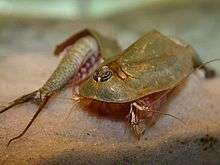Triops australiensis
| Triops australiensis | |
|---|---|
 | |
| Scientific classification | |
| Kingdom: | Animalia |
| Phylum: | Arthropoda |
| Subphylum: | Crustacea |
| Class: | Branchiopoda |
| Order: | Notostraca |
| Family: | Triopsidae |
| Genus: | Triops |
| Species: | T. australiensis |
| Binomial name | |
| Triops australiensis (Spencer & Hall, 1895) [1] | |
| | |
| The range of Triops australiensis | |
Triops australiensis, sometimes referred to as a shield shrimp,[2] is an Australian species of the tadpole shrimp Triops.
Distribution
Triops australiensis has a wide distribution across Australia, excluding the northernmost parts of Western Australia, Northern Territory and Queensland.[3] It is also absent from Tasmania in the south, where it is replaced by Lepidurus apus.[1] The two species can be distinguished by the presence of a supra-anal plate between the caudal rami at the end of the abdomen in L. apus, which is lacking in T. australiensis.[4]
Biology
T. australiensis inhabits temporary pools of water in the arid regions of the Australian outback. When desiccated pools fill with water, the resting eggs hatch into nauplii, and rapidly develop to adulthood. Reproduction succeeds within a few weeks of hatching.[5] Adults achieve a maximum size of around 3 inches (7.6 cm), which is considered large for a tadpole shrimp.
Water chemistry
Triops australiensis can tolerate a pH of 7–9, and can live in both hard and soft water, but the eggs of T. australiensis are more likely to hatch in water with a low mineral content.
References
- 1 2 W. D. Williams (1968). "The distribution of Triops and Lepidurus (Branchiopoda) in Australia" (PDF). Crustaceana. 14 (2): 119–126. doi:10.1163/156854068X00476.
- ↑ "Shield Shrimp". Queensland Museum. 2010–2013. Retrieved 2013-06-13.
- ↑ Michael J. Tyler, Margaret Davies, Graeme F. Watson & David J. Williams (1996). "Significant extension in northern Australia of the known geographic range of the Shield Shrimp Triops australiensis (Crustacea: Notostraca)". Hydrobiologia. 318 (3): 135–137. doi:10.1007/BF00016675.
- ↑ William David Williams (1980). "Arachnids and Crustaceans". Australian freshwater life: the invertebrates of Australian inland waters (2nd ed.). Palgrave Macmillan. pp. 118–184. ISBN 978-0-333-29894-7.
- ↑ Donald Thomas Anderson (1996). "Phylum Crustacea". Atlas of Invertebrate Anatomy. University of New South Wales Press. pp. 26–28. ISBN 978-0-86840-207-9.
External links
 Media related to Triops australiensis at Wikimedia Commons
Media related to Triops australiensis at Wikimedia Commons